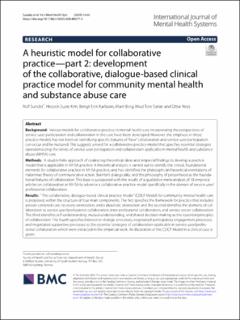| dc.contributor.author | Sundet, Rolf | |
| dc.contributor.author | Kim, Hesook Suzie | |
| dc.contributor.author | Karlsson, Bengt Eirik | |
| dc.contributor.author | Borg, Marit | |
| dc.contributor.author | Sælør, Knut Tore | |
| dc.contributor.author | Ness, Ottar | |
| dc.date.accessioned | 2021-04-26T11:07:43Z | |
| dc.date.available | 2021-04-26T11:07:43Z | |
| dc.date.created | 2020-05-14T06:36:33Z | |
| dc.date.issued | 2020 | |
| dc.identifier.citation | Sundet, R., Kim, H. S., Karlsson, B. E., Borg, M., Sælør, K. T., & Ness, O. (2020). A heuristic model for collaborative practice—Part 2: Development of the collaborative, dialogue-based clinical practice model for community mental health and substance abuse care. International Journal of Mental Health Systems, 14, 43. | en_US |
| dc.identifier.issn | 1752-4458 | |
| dc.identifier.uri | https://hdl.handle.net/11250/2739552 | |
| dc.description.abstract | Background: Various models for collaborative practice in mental health care incorporating the perspectives of service-user participation and collaboration in the care have been developed. However, the emphasis in these practice models has not been on identifying specific features of “how” collaboration and service-user participation can occur and be nurtured. This suggests a need for a collaborative practice model that specifies essential strategies operationalizing the tenets of service-user participation and collaboration applicable in mental health and substance abuse (MHSA) care.
Methods: A double helix approach of coalescing theoretical ideas and empirical findings to develop a practice model that is applicable in MHSA practice. A theoretical analysis is carried out to identify the critical, foundational elements for collaborative practice in MHSA practice, and has identified the philosophical-theoretical orientations of Habermas’ theory of communicative action, Bakhtin’s dialogicality, and the philosophy of personhood as the foundational features of collaboration. This base is juxtaposed with the results of a qualitative meta-analysis of 18 empirical articles on collaboration in MHSA to advance a collaborative practice model specifically in the domain of service user/ professional collaboration.
Results: “The collaborative, dialogue-based clinical practice model” (CDCP Model) for community mental health care is proposed, within the structure of four main components. The first specifies the framework for practice that includes person-centered care, recovery-orientation, and a pluralistic orientation and the second identifies the domains of collaboration as service user/professional collaboration, inter-professional collaboration, and service sector collaboration. The third identifies self-understanding, mutual understanding, and shared decision-making as the essential principles of collaboration. The fourth specifies interactive-dialogic processes, negotiated-participatory engagement processes, and negotiated-supportive processes as the essential strategies of collaboration applicable in service user/professional collaboration which were extracted in the empirical work. An illustration of the CDCP Model in a clinical case is given. | en_US |
| dc.language.iso | eng | en_US |
| dc.rights | Navngivelse 4.0 Internasjonal | * |
| dc.rights.uri | http://creativecommons.org/licenses/by/4.0/deed.no | * |
| dc.title | A heuristic model for collaborative practice—Part 2: Development of the collaborative, dialogue‑based clinical practice model for community mental health and substance abuse care | en_US |
| dc.type | Peer reviewed | en_US |
| dc.type | Journal article | en_US |
| dc.description.version | publishedVersion | en_US |
| dc.rights.holder | © The Author(s) 2020. | en_US |
| dc.source.volume | 14 | en_US |
| dc.source.journal | International Journal of Mental Health Systems | en_US |
| dc.identifier.doi | https://doi.org/10.1186/s13033-020-00377-4 | |
| dc.identifier.cristin | 1810894 | |
| dc.source.articlenumber | 43 | en_US |
| cristin.ispublished | true | |
| cristin.fulltext | original | |
| cristin.qualitycode | 1 | |

